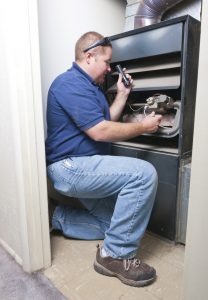 Older heating systems can be put to the test whenever the winter weather gets cold. And as much as we might like them to last throughout the winter, not all of them have it in them. And when your heating system is ready to be turned in for something new, you need to make the replacement quickly, lest your home be without heat and turn into an icebox as a result. How can you recognize when a heater is having problems, and what should you keep in mind as you go about getting it replaced? The more you know, the faster it will be to act.
Older heating systems can be put to the test whenever the winter weather gets cold. And as much as we might like them to last throughout the winter, not all of them have it in them. And when your heating system is ready to be turned in for something new, you need to make the replacement quickly, lest your home be without heat and turn into an icebox as a result. How can you recognize when a heater is having problems, and what should you keep in mind as you go about getting it replaced? The more you know, the faster it will be to act.
When Is Your Heater Ready to Be Replaced?
Excessive costs are usually the culprit when it comes to replacing your old heater. In the first place, you should usually consider repairing it instead of replacing it as long as the warranty is still in effect. That covers the cost of the original parts to the furnace, which makes repairs much less expensive on the whole.
If your warranty has expired, the question of replacement becomes more pressing. It usually comes down to one of two specific costs, though the specifics can depend on your unique situation and the overall state of the heater:
- Repair Costs. If your heating system breaks down and the repairs are excessively expensive, you may want to sink that time and effort into a new system instead of an old one. In addition, if this is the third repair job you’ve performed in the last twelve months or so, a new system may be the best option.
- High Monthly Costs. In these cases, the heater isn’t specifically malfunctioning, but age and wear have taken their toll, and the sheer cost of running it from month to month is excessively high. In many cases, it’s usually best to wait for spring and conduct the replacement in warmer weather, but sometimes the costs are just too high to wait any longer.
What You Need to Know for a Replacement
Once you’ve made the decision to get the heater replaced, you need to think about the factors of your home required for proper power levels. That means square footage, the presence of insulation in your home, the size of your kitchen – which generates more heat than other parts of the home – and little details like windows with a western view that gets a lot of sunlight. (This is one of the reasons why you should always trust a trained experiment with heater installation: they know what to look for.)
Once you have settled on the proper power levels, you want the most efficient heater in your price range, which means checking the AFUE (Annual Fuel Utilization Efficiency) rating. It’s a simple percentage: the higher the number, the more efficient the heater. Once those details are in place, you just purchase your new heater and have it installed.
For high-quality heater replacement services in Portland, OR, call the friendly pros at The Clean Air Act today!
Tags: Heating, Heating Installation, Portland

Join Us Online